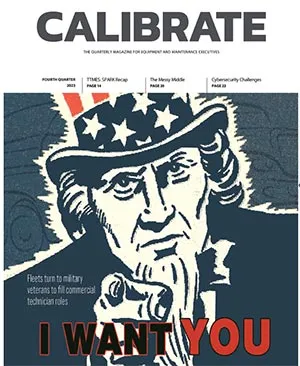Special to Transport Topics
Fleets Turn to Military Veterans to Fill Technician Roles

[Find the latest in equipment & maintenance: Explore this quarter's issue of Calibrate]
Investing in veterans to fulfill the much-needed job duties of commercial technicians has been a concentrated goal for some fleets. Like the driver shortage, which continues to plague the trucking industry, a lack of qualified diesel technicians is another unfortunate reality in part due to the retiring generation of baby boomers and a decline in trade school attendance.
According to the latest Census data, there are more than 18.5 million veterans in the U.S., 7% of the population. According to the U.S. Department of Labor, as of 2021, veterans make up 5.6% of the U.S. workforce. Last year, more than 164,000 men and women transitioned from military service to civilian life. Many fleets are recognizing that this labor pool has great potential to help fulfill these essential jobs.
Ryder System Inc., a Miami-based company that has been designated as “Military Friendly,” has 48,000 employees, including 5,000 trained technicians. “The military instills leadership, teamwork, a strong work ethic,” said Abigail Lawson, Ryder’s senior recruitment director. “Those are all qualities we look for in any new employee.”
To that end, in 2016, Ryder piloted Pathway Home, a diesel technician training apprenticeship program launched on Army installations for soldiers completing their last 180 days in the military.

More Q4 Calibrate
►Military Vets Fill Technician Roles
►Freeze: Spotlight on Technicians
►Buses Leading Race to Electrification
►What's Next for Alternative Fuels?
►Baxter: Confronting Climate Change
►TMC Corner: Cybersecurity Issues
Explore the Issue!
“It’s a 12-week, hands-on training experience and develops requirements in several core technical areas. It provides an online classroom and a hands-on learning opportunity,” Lawson said. Successful completion of the program leads to employment opportunities with the company.
She added that the apprenticeship program is approved by the departments of Labor and Veterans Affairs. “This allows Pathway Home hires to access their VA monthly housing allowance to supplement income as they work toward becoming a master technician,” said Lawson.
Ryder Supply Chain Solutions ranks No. 9 on the Transport Topics Top 100 list of the largest for-hire carriers in North America.
Ryan Georgia’s curiosity for taking apart anything mechanical and putting it back together stemmed from childhood, so it was a natural fit for him to gravitate toward a career that involves fixing vehicles. And Georgia learned about vehicles when he served in the U.S. Army as a Stryker systems maintainer, repairing components of wheeled vehicles. By enrolling in the Pathway Home program, Georgia was able to receive diesel technician training while still in the Army, which eventually led to a job with Ryder.

Through Ryder's Pathway Home program, veterans like Ryan Georgia received the training needed to become a diesel technician. (RecruitMilitary)
“I started as a T2 technician. My manager noticed I had really good leadership skills, and was really good at planning things, scheduling things, and pretty much running the shop, which is where I am right now,” said Georgia, now technician-in-charge at Ryder.
Investing in Veterans/Recruitment
Lawson noted that from 2011 through 2023, Ryder hired more than 14,000 veterans, including more than 350 of those enlisted who completed the Pathway Home program.
The company said female veteran head count increased 32% since 2021. “This is doubly important,” Lawson proclaimed. “As with drivers, the female technician head count is low in the industry, and increasing that in any way is a huge help.”
Love’s Travel Stops & Country Stores employs 4,200 diesel technicians/mechanics and actively works to recruit veterans, in part because of the leadership skills and team-first mentality veterans bring to the table. Love’s recruiters visit bases across the nation to engage with transitioning service members and partners with RecruitMilitary, a company that helps find meaningful employment for veterans and transitioning military.
“We offer a certified SkillBridge program for our diesel technicians that helps move them from active military to the truck care industry,” said Brandon Luiszer, senior manager of talent acquisition for Love’s. SkillBridge is a U.S. Department of Defense program that enables service members to train for various civilian career areas during their last 180 days of service. The store chain also launched Love’s Truck Care Academy last year. The paid, accelerated program develops diesel technicians in 11 heavy-duty systems and consists of classroom and hands-on experience.

Love's Travel Stops & Country Stores employs 4,200 diesel technicians/mechanics and actively works to recruit veterans. (Love's)
RecruitMilitary assists veterans through such tools as job boards, career fairs, headhunting and interview preparation.
“In the first half of 2023, we hosted 50 veteran career fairs and provided 2,800 organizations access to 37,000 veterans. There is no larger aggregate of talent,” said Justin Henderson, RecruitMilitary’s senior vice president of sales and a Marine veteran.
Though RecruitMilitary helps veterans find employment in a multitude of industries, Henderson, who was a motor transport operator while serving, noted that many gravitate toward a career working as a diesel technician, particularly those who worked as maintainers, like Georgia.
“I worked beside these maintainers every day,” Henderson said. “It is such a rewarding job. They can see what they did and know that vehicle is on the road because of them.”
Transferable Skills
Practical skills that many a veteran has picked up while serving are directly transferable to working with trucks.
“A diesel mechanic working on Humvees and 5-ton trucks will roll right into work on OTR trucks,” Henderson said. “You also have construction divisions in the military with bobcats and forklifts.”
As there are many veterans who have worked in mechanical-related positions in the military, Lawson explained that experience makes for a great fit with Ryder. “That group is such a great pool for us because of the translation of the skills.”
Love’s Luiszer concurred, noting that veterans’ characteristics of leadership, self-motivation and technician skills translate well into a career of auto technology.
Ryder’s Georgia said that his military job seamlessly transferred to his current job. He also believes that having a career path planned out helped ease the transition to civilian life.
“Everything was set up for me. I knew what I was doing,” Georgia recalled. “I had a very good idea of what my day would entail; it made it extremely easy to transition.”

Organizations like RecruitMilitary offer assistance to veterans through career fairs to find work after their time of service. (RecruitMilitary)
RecruitMilitary’s Henderson contends that there is a disconnect in corporate America’s understanding of hiring former military members. Part of his job is to help translate those specific skills earned in the military for corporations so that job descriptions can reflect the correct military experience needed for a specific job.
Luiszer agreed that interpreting what a military résumé says and how those skills align with a technician career at Love’s can be challenging. “With three veterans on the recruiting team, we have held trainings to help our team decipher military lingo and pull key information from résumés,” he said.
If a fleet does not maintain a specific program to recruit veterans, Henderson advises going to veteran-related events to talk to them and learn what skills they have accrued in the military. “Then you can build those job descriptions to target those military communities,” he explained.
Retention Strategies
With an already-high turnover rate in the technician field, retention is a major concern, especially for those transitioning from military to civilian life.
To overcome that, Ryder incorporated a veteran buddy program. “We identify current Ryder employees who are veterans,” Lawson said. “They are there to help them with adjustments because they have already walked that path, so we can give them resources.”

Luiszer
Henderson said the hardest part of leaving the military is losing that trust between leadership and subordinates, and “between people to your right and left.” The No. 1 way to retain veteran talent, he said, is to care.
“We have seen really good leaders as well as selfish leaders. Selfish leaders wash out of the military quickly,” Henderson said. “Invest in us, and we will stay loyal to the mission.”
To add interest and engage employees’ competitive spirit, Ryder hosts the Top Tech championship each year, enabling participants to demonstrate technical skills, culminating in a $50,000 cash prize for the winner, while the other nine competitors receive $10,000.
“Programs like that keep them excited about their work and will carry over to retaining our veterans and our civil technicians,” Lawson said.
Likewise, Love’s provides growth opportunities for its diesel technicians. “We have had SkillBridge participants who started with us as diesel technicians and are now leaders in the business,” Luiszer said.
Impact of Hiring Veterans
Despite the small talent pool of veterans, Luiszer contends that “tapping into that source has proven to be an irreplaceable means to staffing our locations with quality technicians.”

Henderson
Lawson believes that hiring military members for technical positions at fleets makes good business sense.
“There is a reason we and other companies are targeting this workforce, this mechanical military occupational specialty. Getting to them before they even exit is a huge advantage for sure,” she said. “Once they get out, they are presented with a lot of opportunities. If we [fleets] did more, we may not have this much of a shortage.”
Henderson noted that although hiring military veterans can help in fleets’ recruitment and retention goals, it’s not an end-all solution to the shortage. However, the current job market conditions favor the veteran employment pool.
“Because there is so little supply and such high demand,” he said, “the compensation for this job and the career path is much higher than five years ago.”
Want more news? Listen to today's daily briefing below or go here for more info:




